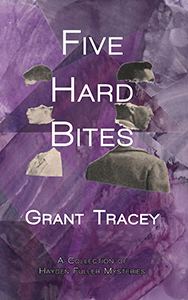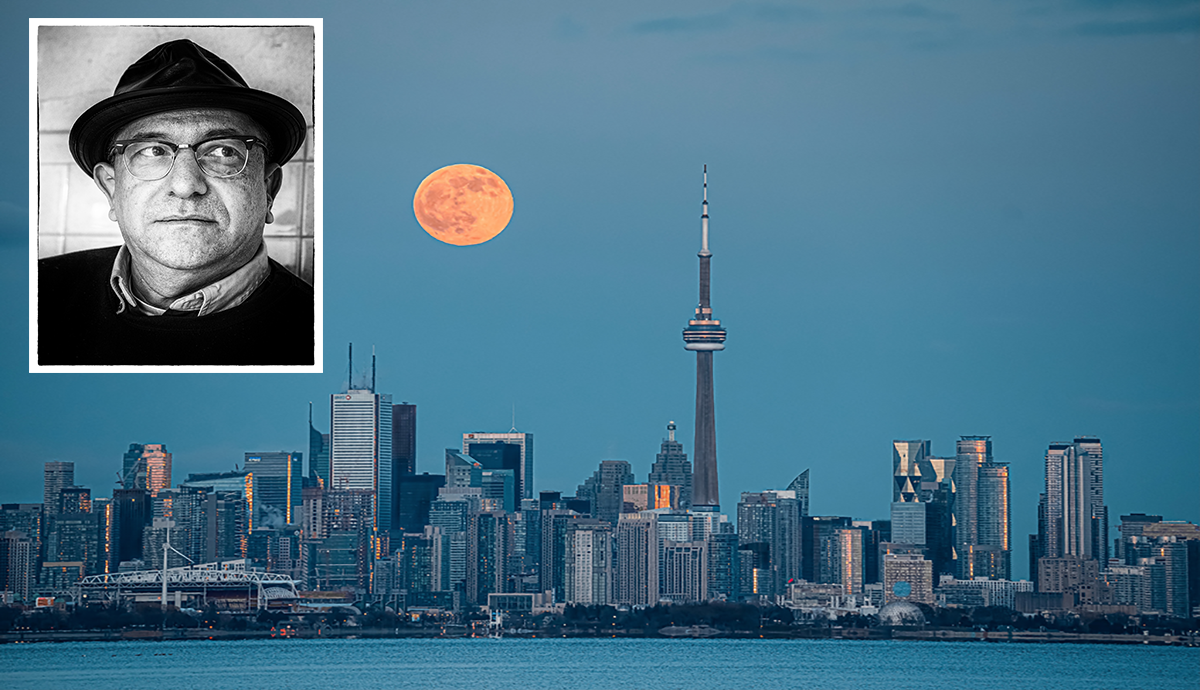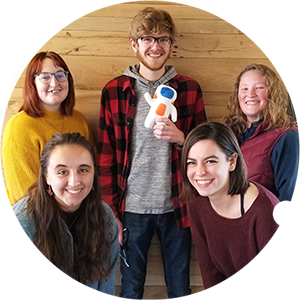Grant Tracey, author of Five Hard Bites (a collection of three detective novels, a long story, and a short story featuring Hayden Fuller), edits fiction for the North American Review and teaches film, modern drama, and creative writing at the University of Northern Iowa. Four-times nominated for a Pushcart Prize, he has published nearly fifty short stories, and acted in over thirty community theater productions. He was a 2021 recipient of UNI's Distinguished Scholar Award.
So, our first question is Halloween-based. Are you currently haunted by any ghosts? This can include literal haunting, past projects you want to return to, lost events, people, etc.
I think the ghost that constantly haunts me is Canada. I miss it. There’s a part of me that would love to live there, but my wife is American, and we’ve got a great life in Cedar Falls. I see myself retiring here. So I guess I write a lot about Canada and I write about the time periods when I lived there, so my memory of Canada—like I go back there and visit, but I’m really kind of stuck in a certain time frame when my most vivid memories are, in the sixties and seventies and into the early eighties before I came to the US. So, I would say that’s a ghost.
What exactly is it about Canada that draws you back to it? Is it just the fact that you’re from there, or is there something else?
Yeah, I think that’s part of it. I know it sounds corny, but also my love of hockey is a part of my DNA and comes from having grown up there. I love the big city of Toronto; I’m a city kid at heart. Cedar Falls and Waterloo are cities but they’re not like, three million people, so I miss that aspect. There’s also an emphasis on social justice up there which is really important. Canada really cares about reparations to indigenous peoples. There’s still a lot of work to be done but I feel like the country is moving in the right direction. Everyone loves mountains and oceans; I don’t care about that stuff. I love pine trees, birch trees, and forests. It’s like upper peninsula Michigan, parts of Northern Minnesota, Ontario, where I grew up, that’s the landscape I like.
What are you working on now?
I’ve got about four Eddie Sands stories I’m trying to get published. He’s a cab driver, and I drove cabs for a year, so I’m kind of tapping into some of the pretty outrageous things that happened to me. He lives in an imagined town of upstate New York, where I used to travel a lot as a kid, and Watertown is the town I had in mind. So Winsome is the name of my imaginary upstate New York town. I got inspired by Ed McBain because his crime novels are set in New York, but it’s not New York; he calls it Isola which is Italian for island. He’s Italian American even though he changed his name to McBain. Anyways, I’ve got about four stories circulating right now. They’re anywhere from 2,000-6,000 words. I’m working on a longer piece set in ‘65-’67; it's gonna be a novella, maybe about 50-60 pages long.
Then, there was a novel I wrote a while ago called Winsome, which was 64,000 words. I sent it to Hard Case Crime and Charles Ardai, the editor, said, “The writing is really good, but I had to push my way through it so I’m gonna pass on this, but I think it’s publishable.” Of course when he said that he had to push his way through it, that made me push it into a desk drawer and get rid of it. And maybe I shouldn’t allow that to be the judgment on it, but then I took that 64,000 word novel and boiled it down to a 6,000-7,000 word story that Jim O'Loughlin published with Final Thursday with the same title, Winsome, but it was totally different because so much of it was stripped away. Eddie Sands, the character in it, is a Korean War-era veteran. I just really like him because he’s a little darker than Hayden Fuller. He’s kind of like—not to be pompous—but there’s a writer I really like called Don Westlake and he wrote a bunch of these Dortmunder novels, and then in the sixties he decided to write this heist guy who steals from the mob and when Westlake wrote those, he decided to give himself a pseudonym which was Richard Stark because those stories were darker. So I feel like Eddie Sands is my Richard Stark story and Hayden Fuller is more my Donald Westlake story, so I’m writing a lot of Eddie Sands short stories right now.
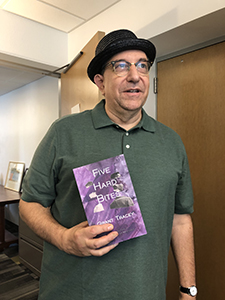
Photo of Grant Tracey taken by Jim O'Loughlin
What’s been your process so far with writing, especially when taking in all the different markets into mind?
It’s very quirky. Sometimes I just read a bunch of pulp novels, just to get my mind kind of in the zone, and then I start writing. I usually write at least the first draft really quickly. I don't have a strong censor or whatever that is. My cognitive side of me doesn’t censor me when I’m writing. I compose on paper; I like writing the first draft in composition books. I just started doing that about ten years ago because I found that I slowed down a little bit and started chasing the characters more and what’s going on instead of the narrative. Somehow, when I’m typing on the computer, I get all into the narrative drive of the story, and when I’m writing by hand, I just feel like I get more nuance. Maybe that’s all BS, but that’s how it feels to me.
The other part of the process is that I like to have hard bop jazz music on in the background because there are no lyrics so it doesn’t distract me. The music I listen to, the stuff I read, and the old games I watch, it’s all very sixties driven. But I like the pulse of the music, so I listen to a lot of stuff like Coltrane, Miles, Sonny Clark, Art Blakey and the Jazz Messengers, Donald Byrd, Hank Mobley. And then occasionally, when I’m feeling more surly and sulky, I will put on punk rock like DOA and Bad Religion and Rancid and the Clash. Oh, and I also watch old time hockey games just to kind of get myself in the mindset of a former hockey player for the Hayden stories. That’s part of the quirky quality to the writing process. And then, I put it aside.
I have a cooling off period. I usually write a 60,000 word novel in about forty days, just writing it straight through. Then I put it aside for a couple weeks and I go back and start revising, showing it to a couple reader friends of mine. My daughter, Effy, has read everything I’ve written. She’s really good at keeping me on task and telling me what’s not working. Mitch, a friend of mine, has also been really helpful at cutting through the crap so that’s basically the process. I enjoy writing crime stuff and I’ve been reading a lot of Erle Stanley Gardner. I’ve read a ton of the Perry Mason books, but in one of the books he cites two books that a lawyer mentions so I actually looked them up—they’re real books.
I’m a seat of the pants kind of writer. I have a skeletal outline of the plot, but I listen to what characters are saying in scenes that I write, and then they morph into choices and those choices take the plot somewhere sideways. In one of the books, actually, the killer changed. I believe in uncertainty and writing from a position of uncertainty and letting the narrative take you on a journey and where that ends up, that’s awesome. Where all these stories took me wasn’t what I thought when I started, but I wasn’t scared of letting them take me somewhere.
You tie in a lot of your experience through your writing, and I know a lot of that experience has to do with film and television. Please think about a character from a current piece of your writing. Who would you cast to play that character? You can pick any actor, from any time or any period.
I’ve thought about this a lot. It took me a long time to come up with this. You’d think it’d be James Cagney for Hayden Fuller because he’s my favorite actor, but he’s not quite right. He’s too energetic and he’s too Irish and Hayden is Jewish. Probably Vic Morrow, who starred as Sergeant Saunders on a TV show Combat! His lineage is from Russian Jewish parents who emigrated to the US. He’s blond but he's got those lines like I have in my face that denote some kind of Eastern European. He’s a really good method actor; he’s intense but he can be gentle too. He doesn't have classic good-guy features so in a lot of movies he played bad guys. I really like Vic Morrow. If I could combine people, I would put a touch of Montgomery Clift into Vic Morrow, because one of the things about Hayden is that he’s sort of a wounded person and nobody was better at displaying sensitivity and intelligence, and being wounded, than Montgomery Clift. So an amalgamation of those two would be perfect for Hayden.
A current actor, like if this really got picked up by HBO, I would love Adam Driver to play Hayden. I just think he can do everything. I loved him in Paterson, I loved him in Black Klansman, I’ve seen him do a variety of roles and he’s edgy but he also can be sensitive so I would say Driver out of the current crop of actors. Oh, and by the way, the guy playing Hayden has to have a buzz cut, that's a deal breaker. A nonnegotiable! In terms of Eddie Sands, I would go with Tom Sizemore, back in his mid-late thirties. Or that Vincent D’Onofrio guy who I think is pretty good. He played in Daredevil and Full Metal Jacket. He was great.
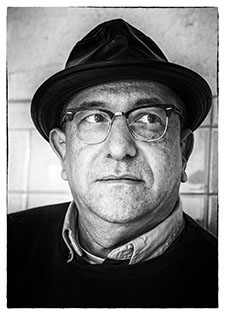
So, we’ll move on to NAR stuff in particular now. As an editor, and as someone who reads just about every submission that is considered for the journal, what do you look for in the first line of a story?
I just want the story to grab hold of me. I know that’s a cliche, but you can do that through a variety of means. I like the one-sentence opening paragraph that establishes maybe a destabilizing condition or something that says what the character might be feeling. I stole that from Rust Hills. Rust Hills used to be the fiction editor of Esquire and he wrote a book on writing and that was one of his suggestions was to have the one sentence opening to a short story. It sort of establishes a lot. I’ve stolen that idea and used it in my own work, but that’s not the only way to get in the pages of NAR. Please, don’t everyone send in one-sentence-intro short stories thinking that’s the only way. Sometimes an opening that is a little bit ambiguous, like you’re reading it and the writer does something slant with the images. It lures you in because there’s something unfamiliar about the
choice of imagery. I like a great narrative telling opening where you establish a backstory. Kind of like what Bernard Malamud would do, or Anton Chekhov. That doesn’t necessarily mean the story has to start fast. I do like a strong plot, but what I mean is, get me emotionally invested in the story quickly. Compelling characters, anything that surprises and delights—I wish I could be more concrete, but that’s the best I can do. I usually find the stories I take forthe magazine, from the very beginning I like them. From the very first sentence.
I’m not as crazy about stories that start with dialogue. I don’t know why, but hey, I just said that, and I can think of examples from the past few years that start with dialogue, so that might be more of my own personal preference in terms of my own writing. I’m big on a variety of approaches, so I don’t have one standard answer for that. As I’ve gotten older, I’ve become more interested in how to tell a story versus how to show a story. I mean, I like both, but I move more and more to the telling side of things.
Is that duality of the inner and outer something you actively look for in submissions to NAR?
I like seeing a balance of that. You can send me anything and if it works, it works, but what I like about the inner is that you can start to move onto a broader canvas. When you’re on the outer, your time is limited to the scene. You’re immediately in the scene, but when you go to the inner, we could be talking months, years, previous generations, there’s just so much depending on your narrative point of view, it’s like the landscape opens up for you. I’m not saying everyone should write like Tolstoy, I don’t even like Tolstoy! But I do like Chekov, I do like Malamud, Molly Antopol—those writers all have an ability to cover a span of time. You’re not so compressed when you get into the inner journey.
Do you have any final thoughts?
What I like about all art is not knowing what’s coming next. It’s the fun part of being a writer. I’m discovering things about myself, but I think I’m always discovering things about the people I’m writing about. The main thing is, I want to write entertaining stories people are going to read and enjoy and say, hey, that was a good crime story. I want to read more of this guy. That’s my end goal, I guess, as a writer.
To read more from Grant Tracey, check out his recently published collection of short stories featuring Hayden Fuller: Five Hard Bites.
